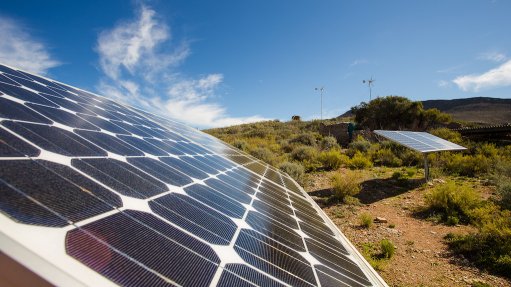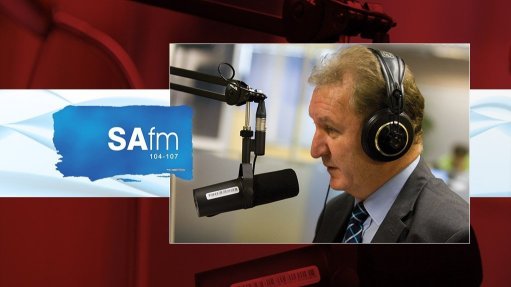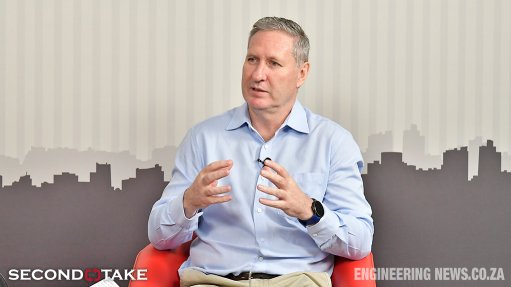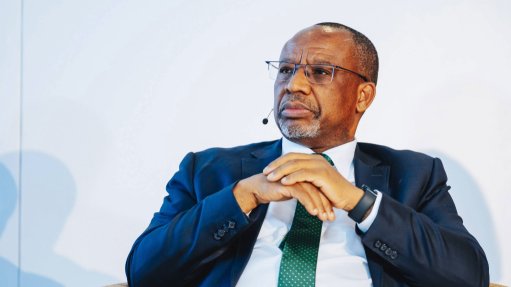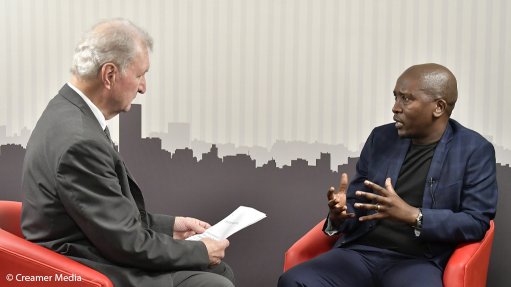IMF warns of considerable economic, social risks for South Africa
The International Monetary Fund (IMF) has noted in its latest Article IV Staff Report on South Africa that the country is facing mounting economic and social challenges.
It projects real gross domestic product (GDP) growth for the country of 0.1% this year, reflecting a significant increase in the intensity of power outages and weaker commodity prices.
The IMF does not expect public debt to stabilise during the Medium-Term Expenditure Framework and recommends stronger fiscal measures by government.
The report outlines the outcomes of the IMF Article IV Consultation in South Africa that was held soon after the 2023 Budget, from March 2 to 17, during which IMF staff discussed economic developments in the country with the government, the South African Reserve Bank (SARB), State-owned enterprises (SoE), parliament, business, labour and academia.
Since the publication of the Budget Review on February 22, some risks to the economy identified in the Budget have materialised.
IMF FINDINGS
The IMF outlines that growth moderated from 4.9% in 2021 to 2% percent in 2022 as the country was buffeted by Russia’s war in Ukraine, global monetary policy tightening, severe floods, and an unprecedented energy crisis.
Business and consumer confidence and investor sentiment remain weak.
The average employment level in 2022 was still about 5% lower than in 2019, threatening social cohesion, it outlines.
Headline inflation has risen above the South African Reserve Bank's (SARB’s) 3% to 6% target range amid higher food and energy prices.
Inflation expectations have inched up but remained within the target range.
In 2022, the current account balance decreased to a -0.5% real GDP deficit from a 3.7% GDP surplus in 2021, owing to lower commodity prices and logistical bottlenecks.
This, together with tighter global financial conditions, shifts in investors sentiment, and increased domestic political uncertainty have weakened the rand, the
The fiscal deficit has continued to narrow, reaching 4.2% of GDP in full year 2022/23, from 4.8% in full year 2021/22, thanks to buoyant revenue and expenditure restraint. Despite this improvement, the government debt-to-GDP ratio is estimated to have increased to 70%, the IMF indicates.
The SARB has proactively raised interest rates to bring down inflation within the target range and anchor inflation expectations, continuing the removal of monetary accommodation, it adds.
Looking ahead real GDP growth is projected at 0.1% this year, reflecting a significant increase in the intensity of power outages, and weaker commodity prices and external environment.
Yearly growth is expected at about 1½% over the medium term, as long-standing structural impediments, such as product and labour market rigidities and human capital constraints offset expected improvements in energy supply, higher private spending on energy-related infrastructure, and a more supportive external environment, the IMF notes.
It says the growth level would be too low to create enough jobs to absorb the new labour market entrants.
The fiscal position is projected to deteriorate owing to weakening mineral revenue, the Eskom debt relief arrangement, wage bill pressures, and rising debt service.
As a result, public debt is not expected to stabilise.
Headline inflation would return to the midpoint of the target range by end 2024, the IMF says.
The current account deficit is projected to deteriorate to about 2½% of GDP in the near term. The outlook is subject to significant uncertainty related to the pace of reform domestically and the challenging external environment, the IMF indicates.
IMF RECOMMENDATIONS
In light of these findings, the IMF has recommended predominantly expenditure-based fiscal consolidation measures of 3% of GDP over the medium-term to put the public debt on a firmly declining path.
It has also called for improving the institutional fiscal framework to support growth-friendly fiscal adjustment, creating fiscal space, and improving risk management.
The IMF also recommends carefully calibrated and communicated prudential measures to mitigate risks from the sovereign- debt nexus and continuing efforts towards a swift removal from the Financial Action Task Force grey list.
It also highlights the need for a well-sequenced implementation of reforms, including urgent advancement of State-owned enterprise reforms, broad-based actions to reduce regulatory burdens and entry barriers, deeper regional trade integration, creating an enabling environment for the expansion of the digital economy, enhancing the flexibility of labour markets to support inclusive growth, a multipronged approach to achieve South Africa’s climate ambition, promoting governance.
Lastly, it recommends continuing monetary policy normalisation as planned, remaining data-dependent, to keep inflation expectations anchored and bring headline inflation back within the target band.
TREASURY'S RESPONSE
South Africa's National Treasury says it appreciates the productive engagement with the IMF and is aware of the downside risks to economic growth and government is working on further measures in this regard.
This includes that Treasury will update its projections to take account of risks that have materialised and present these updates in the Medium-Term Budget Policy Statement (MTBPS) in October.
The 2023 Budget projection was a downward adjustment from the projected growth of 1.4% for 2023 in the 2022 MTBPS.
The 2023 Budget revision was informed by the negative impacts of loadshedding on the economy, stubbornly high inflation, rising borrowing costs, and a less supportive external environment, among others.
The fiscal deficit has narrowed, both as a percentage of GDP and in nominal terms, but risks remain elevated, and some have begun to materialise.
Therefore, government will consider recommendations in this regard to ensure that fiscal imbalances are addressed, and debt stabilises according to the timeframe committed to in the 2023 Budget. Any such measures will be announced in the October MTBPS.
On the financing front, government will continue to maintain an active debt management strategy to manage borrowing costs and maturity risks, and explore further concessional borrowing, including through climate finance.
Treasury says the Eskom debt relief programme and unbundling process provides a clear path for the financial future of the utility, while reducing contingent liabilities.
It adds that government has stepped up efforts to increase private participation in network industries and is considering recommendations to rationalise public entities.
Government is also considering alternative options to the Covid-19 Social Relief of Distress grants beyond 2024 and will seek to finance any permanent replacement grants in a deficit neutral way.
Also, Treasury says that government continues to prioritise the implementation of structural reforms to lift the potential growth rate of the economy.
In the near term, government is addressing electricity and transport challenges, including through fostering greater private sector participation in these sectors, it highlights.
Numerous reforms in other sectors are under way through Operation Vulindlela and the Economic Reconstruction and Recovery Plan, it adds.
On trade integration, the authorities will focus on the implementation of the African Continental Free Trade Agreement (AfCFTA).
On the digital transition, the switch-off of analogue transmission will soon be completed to unlock investment for the rollout of fifth-generation mobile networks.
The ongoing work on promoting digital payment services is expected to broaden access to financial services in the country.
For Eskom, restructuring is ongoing. Treasury also mentions Anti-corruption reforms, including those recommended by Financial Action Task Force and State capture inquiry commission.
Most recently, the Cabinet has embarked on reforms to modernise the procurement system working with the World Bank and the Organisation for Economic Cooperation and Development and approved the long-awaited draft Public Procurement Bill.
The National Anti-Corruption Advisory Council was established to advise on suitable mechanisms to stem corruption. Government also plans to make integrity assessments mandatory for public service recruitment and introduce entry exams. ![]()
Comments
Press Office
Announcements
What's On
Subscribe to improve your user experience...
Option 1 (equivalent of R125 a month):
Receive a weekly copy of Creamer Media's Engineering News & Mining Weekly magazine
(print copy for those in South Africa and e-magazine for those outside of South Africa)
Receive daily email newsletters
Access to full search results
Access archive of magazine back copies
Access to Projects in Progress
Access to ONE Research Report of your choice in PDF format
Option 2 (equivalent of R375 a month):
All benefits from Option 1
PLUS
Access to Creamer Media's Research Channel Africa for ALL Research Reports, in PDF format, on various industrial and mining sectors
including Electricity; Water; Energy Transition; Hydrogen; Roads, Rail and Ports; Coal; Gold; Platinum; Battery Metals; etc.
Already a subscriber?
Forgotten your password?
Receive weekly copy of Creamer Media's Engineering News & Mining Weekly magazine (print copy for those in South Africa and e-magazine for those outside of South Africa)
➕
Recieve daily email newsletters
➕
Access to full search results
➕
Access archive of magazine back copies
➕
Access to Projects in Progress
➕
Access to ONE Research Report of your choice in PDF format
RESEARCH CHANNEL AFRICA
R4500 (equivalent of R375 a month)
SUBSCRIBEAll benefits from Option 1
➕
Access to Creamer Media's Research Channel Africa for ALL Research Reports on various industrial and mining sectors, in PDF format, including on:
Electricity
➕
Water
➕
Energy Transition
➕
Hydrogen
➕
Roads, Rail and Ports
➕
Coal
➕
Gold
➕
Platinum
➕
Battery Metals
➕
etc.
Receive all benefits from Option 1 or Option 2 delivered to numerous people at your company
➕
Multiple User names and Passwords for simultaneous log-ins
➕
Intranet integration access to all in your organisation






